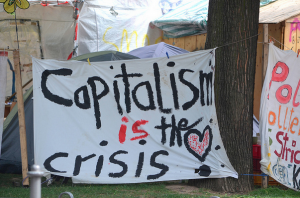Above Photo: Every time an organization broadcasts their commitment to deep social change, while instead prioritizing one-dimensional results for their wealthy funders, the task of dismantling multilayered systems of destruction is lost in translation. (Photo: JT)
How a black youth-led organization aims to cut the profit flow from mass incarceration into the pockets of the wealthy and the multi-billion dollar security industry.
In July 2010, Marissa Alexander, a young Black woman from Florida, faced the fight of her life only nine days after giving birth to her youngest daughter. Her estranged husband, Rico Gray, attacked, strangled, and threatened to kill Marissa in her own home. To get rid of Rico, Marissa fired a warning shot into the ceiling. The single shot injured no one. And yet she was subsequently charged with several criminal charges and incarcerated for a victimless crime.
Marissa’s story is just one example of how prisons, profit, policing, and poverty are intimately connected. Prisons have long been warehouses for the poor and individuals who are unable to defend themselves in a vicious legal system. Undue profiling by law enforcement has long been the gateway into the incarceration system. And increasingly rich people and the multi-billion dollar security industry make money off of mass incarceration.
Marissa Alexander fought a long battle in the Florida courts to appeal her conviction on the basis of her right of self-defense. She eventually was successful and in 2015 she was released from jail and put on probation. But in the meantime, she paid a high cost. Throughout her entire ordeal, she not only missed irreplaceable time with her children. She also had to pay $105 every week for the use of an ankle monitor while she was under house arrest and an additional $500 every other week for a bond cost.
Rich people and the multi-billion dollar security industry are increasingly making money off mass incarceration.
Even after coming to a plea agreement with the state of Florida on lesser charges, Marissa still had to pay continued costs for house detention and wearing a surveillance monitor. These costs do not include the additional financial burden placed on her family to travel to and from prison.
Alongside a booming prison population in the United States there are booming profits for corporations that create products and services for the criminal justice system. Increasingly, state governments have shifted the cost for these services directly to those being punished. Simply put, mass incarceration and the criminalization of young Black people has been nothing more than a massive payday for these kinds of corporations.
Many states no longer directly manage jails and prisons but pay corporations to do so. At times when jails have not been filled to capacity with Black bodies, these companies have sued the states for financial loss. While the majority of prisoners are not housed in private prisons, an American Civil Liberties Union study reports that the private prison population increased 1,600 percent between 1990 and 2009. The two top private prison companies received over $3 billion in revenue in 2010 alone. Those incarcerated in federal prisons and immigration detention centers are most likely to be in a for-profit private facility, where conditions in many cases are “atrocious,” according to the same ACLU study.
As part of a broader “Agenda to Build Black Futures” published by the Black Youth Project 100 (BYP100), we identified several ways to eliminate profit from punishment. First, we need to abolish all fines in the penal system and administrative fees for probationers and parolees because any transfer of our scarce family wealth to the prison industrial complex cannot be allowed to stand. Fines for minor and petty crimes and misdemeanors should also be ended. It is becoming more and more evident that law enforcement agencies are used as tools to take advantage of young Black people in over-policed areas, particularly for petty crimes like parking infractions, jaywalking, public intoxication, and low-level marijuana possession.
A student-led campaign succeeded in making Columbia University the first to divest from a private prison company.
The profit motive in the penal system is a corrupting force that motivates police and judges to unnecessarily incarcerate and criminalize in order to maintain profitability of powerful moneyed interests. One way we can undercut this is divesting public and higher education funds from the prison-industrial complex. At Columbia University, for example, the Columbia Prison Divest campaign is led by students, including a BYP100 member. This campaign demanded the immediate divestment of all shares from the private prison corporation CCA and the private security company G4S, leading to Columbia University being the first college in the United States to do so.
We also need to reduce police budgets and reallocate residual funds to the people’s vision of public safety. Establishing participatory municipal and state budgets is an avenue that would allow the public to democratically decide how to allocate funds towards services and institutions critical to our survival and success.
The profit motive in the criminal injustice system is immoral and must be eliminated. Mass incarceration of Black people should not lead to unprecedented profit for corporations, government or any individuals. We must demand that all institutions divest immediately from racist and classist systems of punishment.

